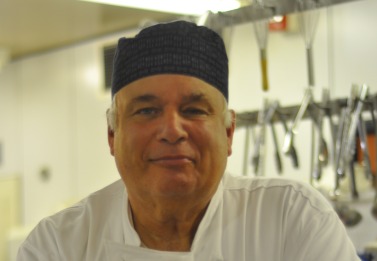
New chef has fresh plans for MVHS cafeteria
It’s time for Emerin’s Diner to welcome its new worker, and its new name.
On Sept. 30, Food Services Supervisor Frank Lihn took charge of the kitchen with the retirement of long-time supervisor Emerin Wang earlier this month. In his new position, Lihn hopes to make significant changes to the school’s menu.
“[I want] to try to move from what we’re doing now into more from-scratch cooking,” Lihn said.
According to Lihn, the food currently being served at MVHS’ cafeteria is processed and pre-packaged, creating a quick solution to the problem of feeding 2,500 hungry students and staff within 45 minutes each day. Though he agrees that using packaged food is faster and more efficient than making food from scratch, Lihn points out that freshly cooked food is, without a doubt, healthier.
“It’s called processed for a reason,” Lihn said. “You’re going to have food additives. You’re going to have a lot more salt than [what] is necessary. You’re going to have all sorts of chemicals.”
 Lihn also asserts that the use of fresh ingredients such as herbs and spices will make food taste better. But taste, he says, is not nearly enough.
Lihn also asserts that the use of fresh ingredients such as herbs and spices will make food taste better. But taste, he says, is not nearly enough.
“It’s commonly said that you eat with with your eyes,” Lihn said. “Even if something tastes marvelous, people are going to pass it by if it doesn’t look attractive.”
For Lihn, preparing tasty, well-presented meals from scratch is not an alien concept. Earlier in his career, Lihn worked as a chef in such places as New York City’s Waldorf Astoria Hotel, Plaza Hotel, and the United Nations Dining Hall, among others. Add 10 years of experience working in schools, and it’s safe to say that Lihn is no stranger to cooking.
Lihn’s main concern about transitioning to an all-scratch menu is not his own ability, but whether his staff is prepared for the scale of the transition phase. Lihn says that, in any business, it’s important for a manager not to put pressure on their staff to do something with which they aren’t accustomed. Because of this, he says, the transition may be a slow process. Despite the difficulties ahead, Lihn has full confidence in his staff’s ability and readiness to undergo the transition process.
“I have an incredible staff here,” Lihn said. “Chun-Mei [Lundgren, the head cook,] is outstanding. She’s anxious and willing to go to more scratch kind of cooking.”
Among Lihn’s favorite foods to prepare are soups and salads, which he also likes to decorate. In his spare time, he also enjoys baking.
Before coming to Monta Vista, Lihn worked as a Food Services Administrator in several California school districts, where he tried to implement cafeteria policies of serving freshly prepared food. Lihn described many schools that he visited as being heavily dependent on packaged food, to the extent that the only tools the cafeteria workers needed were box-cutters.
When asked why Lihn chose to work at a school rather than as a district administrator, Lihn replied that he missed working in the kitchen, directly with the food.
“I also like working with kids,” Lihn said, “interacting with them, watching them grow up."
Lihn and his new policies seem to have struck up a strong rapport with the student body. Some students anticipate his cafeteria policies, and receive them positively.








